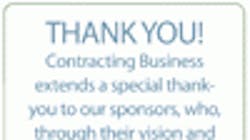Quality Comfort Toughs It Out!
Your success is always going to come down to you. And to the actions that you — as a quality residential HVAC contractor — take to muscle through an economic downturn.
Our 2010 Quality Home Comfort Award winners gave their best to these projects, which represent their best work for homes in a wide range of sizes and descriptions.
From smallest to largest, these fine projects show the HVAC industry at its best: as marketers who are reaching customers through not-so-complicated methods; as troubleshooters and problem solvers on the scene to fix a job gone wrong, or move a mountain; and, as comfort consultants who apply years of experience, and put the finest HVAC products to work in pursuit of quality comfort.
We hope these stories help to encourage you to continue to do your best, and perhaps enter our 2011 contest. We’ve also added some comments from three past QHCA winners on how they stay focused on quality. Read on and be inspired.
Strong Quality Beats a Weak Economy
BY RON RAJECKI, CONTRIBUTING EDITOR
How can you maintain quality as the focus at your company, even in the face of a harsh economy?
Contracting Business asked three past (and perhaps future) Quality Home Comfort Award winners how they keep quality at the forefront at their companies, even in tough economic times.
At Keil Heating and Air Conditioning, Riverdale, NJ, the commitment to quality starts with the company’s weekly service meetings. “In those meeting we review all our current jobs,” says Barbara Keil, co-principal of the company. “If we have a job that had a problem or a callback, we review it and get feedback from everyone on how it could have been prevented, or can be fixed.”
Keil says it’s important that such input is always framed in a positive manner, so everyone can learn from a problem. “I’m not looking to throw any of my technicians under the bus,” she says. “It’s not that we’re trying to make someone uncomfortable, we all want to learn from it.”
On the flip side, Keil and her team also review what’s gone right. “We constantly do surveys with our customers, so when we get positive feedback, we bring that up at every meeting,” she says. “We talk about what customers liked about us. It’s important for our guys to hear about the positive impressions they’re providing.”
The company also sees slower times as an opportunity to ensure high quality by stepping up its training.
Russ Donnici, founder and president of Mechanical Air Service, San Jose, CA, also uses slower times to focus on training.
“We generally train in-house weekly or every other week, our distributors are consistently offering courses, there are an increasing number of webinars available, and we’re also training people in our office to do certified energy audits. So we take advantage of as much of that as we can while we have the time to do it,” Donnici says.
A strong commissioning program is a good way to ensure that quality is maintained, as the first step in the commissioning process is to do a high-quality installation. Donnici says Mechanical Air Service does a fair amount of recommissioning on systems that never were commissioned, or were commissioned improperly.
Tom Casey, CEO and co-founder of Climate Partners, Milford, CT, says that, good economy or bad, quality is something you must build into your company’s culture.
“Focusing on quality in a tough economy is even more critical than in a booming one,” Casey says. “In tough economic times, everyone is competing on price, which is a losing proposition no matter how you look at it. If you don’t want to compete based on price, you must increase the quality. So, you build quality into your culture, your people, and your processes.”
Competing on quality rather than price means not everyone is going to be your target customer. “Build your sales process around your identity and send out the right messages,” he says.
Finally, Casey says, make sure you’re truly delivering quality, by implementing a formal quality control process that puts the customer in the center of everything you do. Tough economic conditions don’t last. However, tough, smart companies that focus on quality and training, and refuse to let an economic downturn drag them into the “low price swamp,” will survive and thrive.
